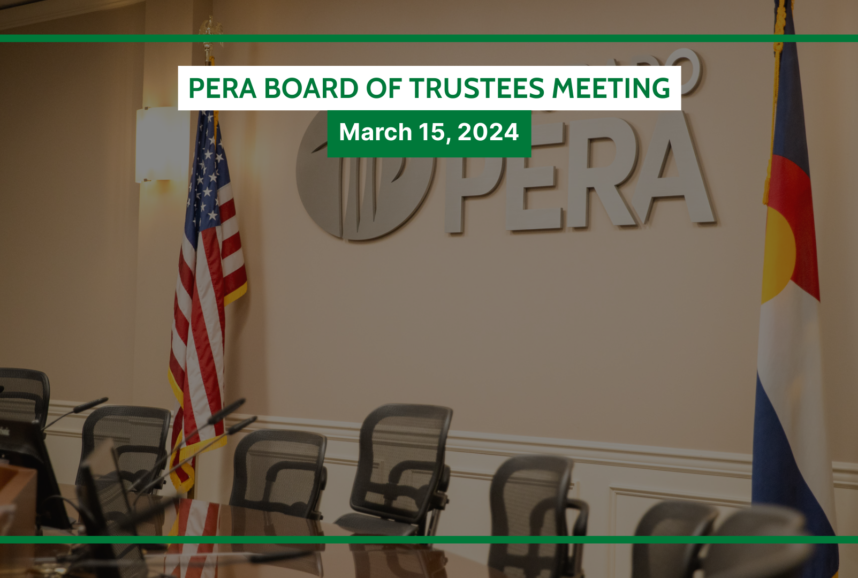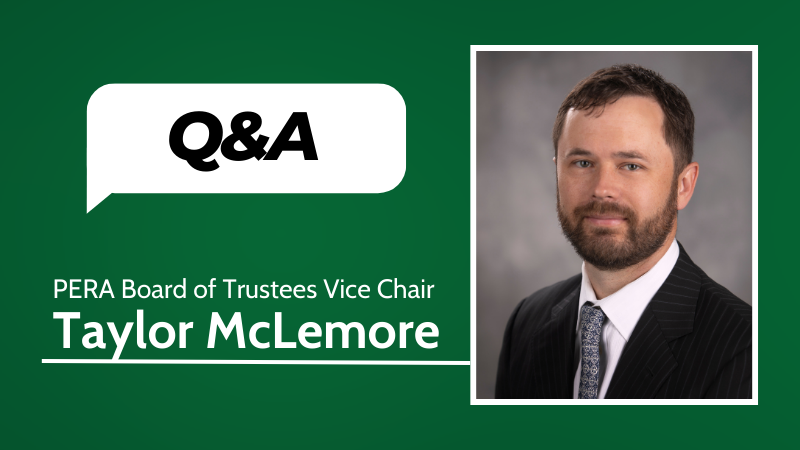Chipotle’s original store is in Denver, just a few blocks west of the University of Denver. Its quaint corner location has withstood more than 27 years of branding changes; a green sign that vaguely resembles a space-age burrito with a bite taken out of one corner comes across as a family-owned business more than a nationwide chain worth $37 billion.
But it’s not family-owned, at least not anymore. It’s been publicly traded since 2006. In fact, PERA is a shareholder in this homegrown company. At the end of May 2021, PERA owned 4,808 shares—worth about $6,823,000. That’s a lot of guac. That means PERA gets 4,808 votes when the board of directors of Chipotle Mexican Grill, Inc., holds their annual shareholder meeting.
Shareholder voting might seem removed from PERA’s core mission. But it’s an integral piece of being an engaged investor. PERA votes in more than 6,000 annual meetings, casting more than 60,000 votes backed by billions in publicly-traded investments.
The Making of a Ballot
Four to five months before Chipotle held its annual meeting on May 19, 2020, shareholders submitted proposals to be considered. At the most fundamental level, these shareholder proposals are ideas to improve the company’s governance, reduce investment risk, and strengthen long-term shareholder value.
Not every shareholder proposal gets a spot on the ballot, however. A company may challenge a shareholder proponent and attempt to exclude the proposal from its ballot. This is when the Securities and Exchange Commission (SEC) steps in to settle the dispute. The SEC reviews the challenge to determine if the proposal(s) qualify to be on the ballot. Among other things, a proposal must not interfere with “ordinary business.” In other words, a proposal must not overstep the authority given to staff and to the board of directors. The SEC relies on rules and precedent to make a determination on each ballot proposal.
Once the approved measures are finalized, the ballot, which in most cases includes items like the election of board members, is sent to shareholders. The ballot for Chipotle’s May meeting contained seven proposals, four of which came from shareholders. Companies typically include information such as a description of the proposal and the rationale behind the Board’s position, if applicable, similar to the Blue Book that Coloradans receive before elections. You can see the full ballot from Chipotle’s May 2020 meeting here.
The Ballot Arrives at PERA
With tens of thousands of proposals to sort through every year, voting season never ends for institutional investors like PERA.
Luz Rodriguez is PERA’s Senior Analyst in the Investment Stewardship division. She spends a part of each day reviewing proposals and submitting votes. It’s a monumental task. To aid in the research and analysis for every vote, PERA employs the help of a proxy voting service. In addition to research, this service also provides a digital platform that helps manage and organize the constant inflow of ballots.
When a company sends a ballot to PERA, it gets routed through this digital platform where the Investment Stewardship staff can review and submit PERA’s vote. How does PERA staff know how to vote? PERA’s Board has established a Proxy Voting Policy that guides staff on how they make voting decisions.
For example, if a board member of a company attends less than 75 percent of board meetings and committee meetings, PERA will not support that board member’s reelection. Policies like this, which call for a specific vote for or against, are coded into the digital platform PERA uses to vote. For other ballots issues that do not fall into this category, the Policy guides staff to vote on a case-by-case basis.
The best position for PERA to take on any given proposal is sometimes tough to discern, even after being filtered through PERA’s voting policies and procedures. About one in ten shareholder proposals requires a case-by-case review. In these instances, PERA’s Investment Stewardship team reviews each one and performs a more in-depth analysis. Depending on the topic, they might consult with other investment staff and even with other shareholders on occasion. They also reach out to the company directly if they need clarification.
Considering Each Vote
In April 2020, proposal #6 on Chipotle’s May 2020 ballot landed on Rodriguez’s desk. The shareholder proposal, which Chipotle’s board of directors opposed, was titled “Shareholder proposal requesting a report on arbitration of employment-related claims.”
The proposal, if passed, would require Chipotle to do the following:
- Report on its use of mandatory arbitration provisions in employee contracts
- Specify the percentage of its workforce subject to these provisions
- Specify how many claims employees initiated and how many claims were decided in favor of employees
- Share how Chipotle updated policies after California proposed banning mandatory arbitration in employment agreements
Chipotle’s board opposed this proposal, saying it would be too costly, offer few benefits, and cited privacy and speed as reasons arbitration was a preferable alternative to taking disagreements to court.
Because this issue dealt with corporate governance but was not specifically addressed in PERA’s voting guidelines in effect at the time of vote, a case-by-case analysis was performed.
Making a Decision
PERA staff does not analyze proposals like this in a vacuum. PERA’s investment goal—to maximize risk-adjusted long-term investment returns—remains at the center of every analysis prior to voting. Proposals are assessed on whether and how they affect the long-term financial stability of a company.
PERA’s analysis of proposal #6 concluded the following:
- The proposal was reasonable, sufficiently narrow, and would not infringe on Chipotle’s judgment on the appropriateness of arbitration
- PERA generally opposes forced arbitration as it diminishes shareholder and other stakeholder rights
- Employment-related claims can lead to significant legal, human capital, and reputational costs. Receiving more information about the use of arbitration would be useful to assess risk.
PERA ended up voting in favor of this proposal.
The Long-term Impact of Stewardship
Think about the ballot you cast last November. You likely remember who you voted for president, and you probably remember which Senate candidate got your vote. How many other issues, offices, and ballot measures do you remember?
It’s easy to lose sight of the potential impact that lies behind each vote when your ballot runs three, four, or five pages long. When an institution like PERA casts hundreds or thousands of votes every month, the magnitude of this task can have a blinding effect to outside observers; it’s almost impossible to comprehend, so it is easy to look away and move on.
But PERA takes each vote seriously. This work is done transparently as every vote is published online. To stay current, the Board reviews and updates its voting policies on a regular schedule.
Being an engaged shareholder of more than 6,000 publicly-held companies is an action that connects the sometimes abstract idea of investment Stewardship to the tangible mission of providing retirement security to PERA members and retirees. Shareholders don’t run the companies they invest in, but they can help make sure that elements crucial to a company’s long-term success, like effective governance and strong stakeholder rights, are attended to.
In the case of proposal #6 on last year’s Chipotle ballot, PERA voted in line with the majority of investors. It was close: the final tally was 11,552,113 votes for and 11,098,669 against. Earlier this year, Chipotle released the information this ballot proposal called for.
The Results of Voting
Shareholder ballots allow PERA to be an engaged investor, voting on issues that can affect a company’s long-term sustainability and investment returns. Voting also allows PERA staff to continually learn about emerging issues that can affect shareholder value.
For example, the issue at the heart of proposal #6, managing human capital effectively, is not unique to Chipotle. In fact, more and more ballot proposals like this have appeared in recent years. In response, PERA staff made a recommendation to the Board to update its Policy to include guidance for human capital management disclosures and mandatory arbitration provisions.
The Board’s proxy voting Policy was formalized and established in 1979 and has been updated many times since. It’s a dynamic document, the product of a continual flow of information among the Board, PERA staff, and the companies in which PERA owns shares. It’s also a plus for PERA members. As this year’s Stewardship Report states: “The Policy acts as a public statement on why and how we make voting decisions, and can guide conversations with companies, peers, and stakeholders around PERA’s stance on a variety of issues that can affect financial value. The Policy parameters seek to encourage public companies to adopt sound business practices that align with sustainable shareholder value creation.”
StewardshipThe practice of overseeing or managing something entrusted to one’s care. PERA’s approach to investment stewardship is focused on ensuring the financial sustainability of the fund that pays benefits to retirees and beneficiaries.StewardshipThe practice of overseeing or managing something entrusted to one’s care. PERA’s approach to investment stewardship is focused on ensuring the financial sustainability of the fund that pays benefits to retirees and beneficiaries.Proxy votingThe process by which shareholders can vote on corporate proposals without being present at a shareholder meeting.





Thank you for the info, regarding the stewardship that PERA manages on behalf of its members. These things we take for granted. I have been enlightened! Again, thank you.